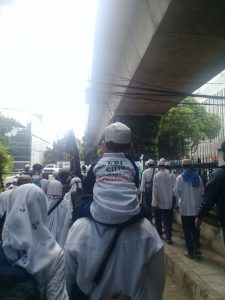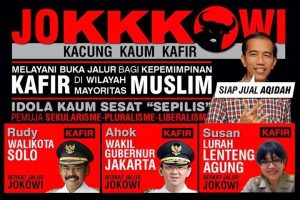Issues of inequality and injustice, and expressions of grievance against the status quo, are increasingly being framed by racial and religious identity in Indonesia, write Inaya Rakhmani and Vedi R. Hadiz
The first anniversary of the largest religiously-driven mass demonstration in Indonesia has just been celebrated by some of the organisations that were its driving force.
A year ago, in December 2016, millions of Muslims descended upon Jakarta and joined with large numbers of the capital city’s residents in a rally called the Action to Defend Islam (Aksi Bela Islam). The demonstrators demanded that then governor of Jakarta, Basuki Tjahaja Purnama (better known as ‘Ahok’), be stripped of his governorship and put on trial for blaspheming against the Islamic religion in an off-the-cuff campaign speech.
Now imprisoned, Ahok had controversially commented on a Quranic verse, which suggests that Muslims should not appoint a non-Muslim leader. Ahok himself is a Christian and ethnic-Chinese, thus part of a social group seen to have benefitted from state policies going back to colonial times allowing for the concentration of wealth in their hands.
Wilson (2016) and Mietzner and Muhtadi (2017) respectively saw the 2016 protests as being due more to the destructive effects of economic inequality, on the one hand, and primordial, religious sentiment on the other. But the Ahok case showed a link between expressions of Muslim solidarity and resentment of existing socio-economic conditions.
Many people, especially the young, now feel let down by the promises of modernity and development
Such resentment is not exclusively held by poor Muslims. It is also held by a cross section of the young and educated middle class whose aspirations for upward social mobility have been dampened by actual circumstances they confront.
Thus, as Wilson implies in his explanation, Ahok’s controversial program of urban redevelopment, involving mass evictions, accentuated the already strong sense of precarious existence that permeates through Indonesian society.
Growing levels of piety as election looms
Many people, especially the young, now feel let down by the promises of modernity and development that had been instilled through educational and other institutions. Yet responses have been increasingly articulated through the language of religious morality, reflecting the growing levels of piety within Indonesian society and enabling the sort of religious solidarity to which Mietzner and Muhtadi refer.
In fact, the connection between socio-economic grievances and strength of religious sentiment has facilitated the emergence of a ‘market of morality’, a space through which Islamic symbols are consumed and reproduced as an expression of grievance against an unjust status quo.
The workings of this market are virtually guaranteed to be salient in Indonesian democracy all the way up to the 2019 presidential election, and perhaps beyond.
Struggles of a perpetually marginalised, virtuous majority are imagined as a narrative of oppression
Islamic morality potentially provides a rich cultural resource pool for competing elites to exploit, including in many of the 171 local elections due to take place across the archipelago in 2018. Mass mobilisations of support, when required, may be expedited by a particular kind of narrative of oppression that was used so well against Ahok in Jakarta.

This is one that emphasises the struggles of a perpetually marginalised, virtuous majority that are imagined as an ummah (community of believers). The ummah is contrasted against the greedy business elites labelled as the ethnic Chinese minority, who are in turn also backed by corrupt and powerful political figures.
Impact on looming presidential contest
It appears likely that the 2019 presidential contest will once again pit President Joko Widodo (Jokowi) against his nemesis, Prabowo Subianto. Jokowi has already been confronted by rumours about his identity, churned out mainly through social media both by buzzers and internet users, which alleges his role in allowing Chinese influence into Indonesia by also casting doubts on his Muslim credentials.
By contrast, Prabowo and his allies—including Anies Baswedan, who is also seen to harbour presidential ambitions after defeating Ahok—have made it a point to seek alliances with more hardline Muslim organisations.
Survey of perceptions among Muslim activists
In a survey of 600 people who participated in the Action to Defend Islam, we sought to understand the link between perceptions of social injustice, adherence to Islamic morality and political action. Sixty five per cent of our respondents were male, which partly reflects lesser levels of female participation, while a significant portion (109 people) were low-to-mid-ranking employees of private companies or students (101 people).
Concerns about social injustice are deeply linked to anxieties about the future held by young and educated Muslims with aspirations for upward social mobility
A slight majority had completed tertiary education (51 per cent) while secondary education was the highest attained by 47 per cent of our respondents. No less than 44 per cent reported monthly household expenditures of between Rp4.5 to 7 million a month (A$450-700), which place them in the lower middle-class bracket or at borderline middle class. Reflecting the youthful nature of Action to Defend Islam, 60 per cent of respondents were in their 20s, 18 per cent in their 30s, while only 14 per cent were over 40 years old.
These numbers suggest that concerns about social injustice are deeply linked to anxieties about the future on the part of young and educated Muslims with aspirations for upward social mobility. Most respondents had attained higher levels of education than their parents but were saddled with the reality or prospect of insecure employment.
Education fails to deliver
The promise that education would increase opportunities for more secure social status is increasingly doubted, resulting in more grievances being directed at those perceived to have unfairly attained economic and social access.
Commonly held gripes appear to have produced similar political attitudes amongst our respondents. While the anti-Ahok mobilisations of 2016 were spearheaded by hardline groups like the notorious Islamic Defenders Front (FPI) and the now-banned Hizbut Tahrir Indonesia, nearly 60 per cent of respondents claimed affinity with mainstream Islamic organisations like the Muhammadiyah and Nahdlatul Ulama. These organisations are usually held up as guardians of ‘moderate’ forms of Islamic politics in Indonesia.
This is not so surprising, however, because our survey shows little difference in adherence to opinions on many questions pertaining to Islamic morality among those who veer toward moderate or hardline organisations.
Moderate Muslim organisations perceived as incapable of addressing universally-held anxieties
These include attitudes toward non-Muslims, the role of women in society and religiously acceptable economic activity. It appears that moderate Muslim organisations are perceived to be incapable of addressing universally-held anxieties, driving respondents to support the more assertive narratives of marginalisation deployed by hardline Muslim groups.

Interestingly, one-fifth of our respondents felt that not one Islamic organisation actually represents their interests. As a consequence, hardline narratives are being mainstreamed into Muslim politics previously led by moderate Islamic organisations.
Long-term impact of negative social circumstances
These results do not reflect a set of social circumstances that have suddenly come into being. Since the late 1980s, the neoliberalisation of the Indonesian economy has eroded public institutions and increased competition between individuals, in a context largely devoid of social safety nets beyond the family.
Because the market is too abstract to be blamed, the most convenient scapegoats are ‘others’ defined as being firmly outside of the toiling majority.
The Ahok case, which displayed strong anti-Chinese sentiment, shows that market injustices can be smoothed over by the idea that the Muslim majority has been systematically marginalised in competition over economic resources.
It also shows that political elites are ready to take advantage of the anxieties of young and educated Muslims and their problematic aspirations of upward social mobility.
Consequently, issues of inequality and injustice will be increasingly framed on the basis of racial as well as religious identities, thereby neglecting how these are more fundamentally related to neoliberal transformations and the nature of economic and political power.
Featured image: Action to Defend Islam protest, Jakarta, 2 December 2016 Photo: Fathiyah Wardah Source: VOA Indonesia
Vedi R. Hadiz is Professor of Asian Studies, University of Melbourne, a former visiting scholar at universities in Europe, and currently an adjunct professor in Indonesia. His latest book is a study of Islamic populism in Asia and the Middle East.
Dr Inaya Rakhmani is a lecturer in communications in the Faculty of Social and Political Sciences, University of Indonesia, and head of its Communication Research Centre, and an associate at the Asia Research Centre, Murdoch University.

